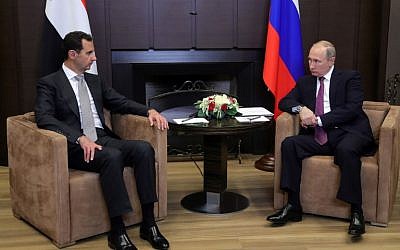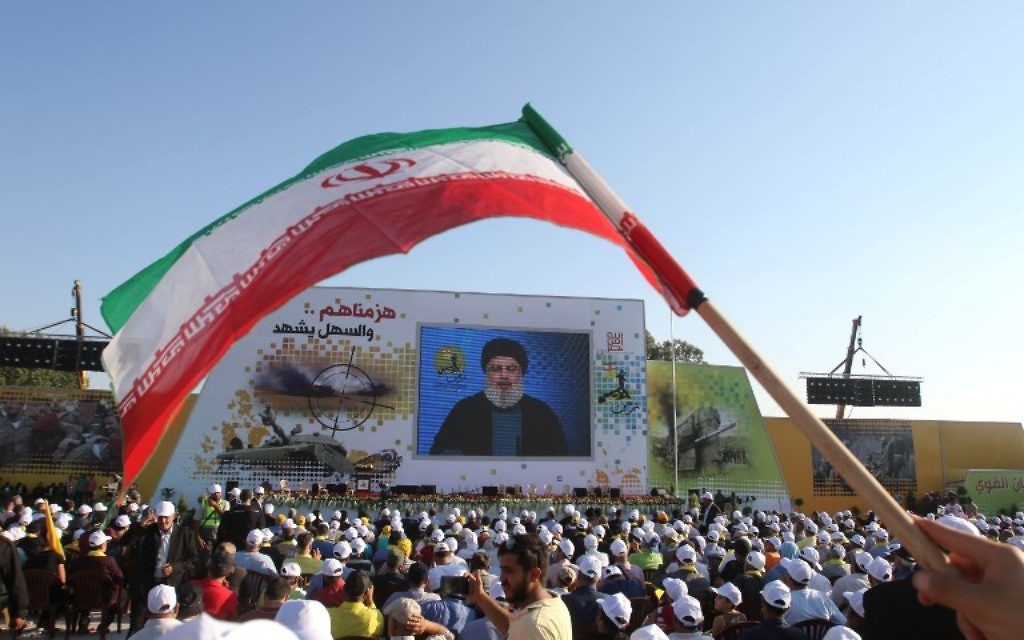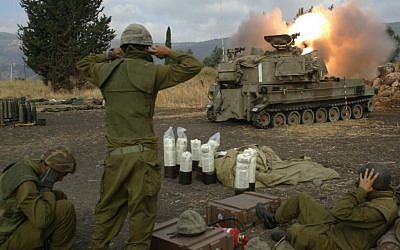With new report, the Crisis Group, a think tank and advocacy organization, tries to get Moscow to accept role of mediator between Israel, Hezbollah and Iran
As Syrian dictator Bashar Assad fights to regain control over the last holdouts of rebel resistance, the seven-year-old civil war is entering a new phase that is setting Israel on a collision course with the Iranian-Syrian-Hezbollah axis.
This can be seen in the recent airstrikes in Syria reportedly conducted by Israel and — as importantly — in the increasingly brazen ways that Damascus has responded to them. The most recent example was early Wednesday morning when, according to Syrian reports, Israeli aircraft bombed a military scientific research facility outside Damascus, which is suspected of both developing chemical weapons for Assad and assisting Iran and Hezbollah in improving their missile technology.
According to a new report by the International Crisis Group, a think tank and advocacy firm, the only figure able to prevent a full-fledged, bloody conflict between Israel and the Iran-led axis is Russia, which has emerged from the Syrian civil war as the sole remaining powerbroker.
The United States is barely mentioned as having a role to play in any potential deescalation efforts, in light of both Moscow’s rising status in the region and America’s diminishing one, as it significantly scaled back its involvement in Syria over the past few years, according to Ofer Zalzberg, a Jerusalem-based analyst for the Crisis Group who helped write the report.

“Only Moscow is in a position to mediate a bolstering of the deescalation agreement. Unless it does, the rules of the Syrian game are likely to be worked out through attack and response, with risk of escalation,” according to the report.
The Crisis Group’s report, “Israel, Hezbollah and Iran: Preventing Another War in Syria,” was released on Thursday. It is the result of a year’s worth of interviews by researchers for the organization with diplomats and defense officials in Jerusalem, Tehran, Beirut, Washington, Moscow and Amman, Zalzberg told The Times of Israel on Wednesday, ahead of its publication.
Only Moscow is in a position to mediate a bolstering of the deescalation agreement
As the Crisis Group also functions as an advocacy organization, it has not only released this report to the public, but has been working directly with Russia to try to persuade it to accept the role of mediator between Israel, Hezbollah, Iran and Syria.
“And we are seeing some traction with Russian officials,” Zalzberg said.
The group outlines three main aspects that would need to be addressed: the presence of Iranian and Shiite forces near the Israeli border; the construction of Iranian military infrastructure in Syria; and reaching an agreement that “whatever happens in Syria, stays in Syria,” so that fighting doesn’t spillover into Lebanon.
The report does not indicate that a conflict between Israel and Hezbollah is imminent, as both sides currently see value in maintaining a relative calm, but implies that as the Iran-Syria-Hezbollah axis wrests back full control over the country, the Lebanese terrorist group could start antagonizing Israel from southern Syria, where it enjoys something of an advantage, as it has few significant assets in that area for the Israel Defense Forces to strike.

Hearing from the various parties, the Crisis Group analysts came to the disconcerting conclusion that the sides do not have a clear understanding of each other’s concerns and desires, which raises the potential for the kind of miscalculation that leads to war, Zalzberg said.
For instance, he said, Israel does not see Hezbollah and Syria as being independent actors, with their own goals, but as little more than “marionettes” controlled by Iran — a view that is not shared by Iran, Syria, Hezbollah or Russia.
What is it good for? Absolutely nothing
Beginning in September 2015, Russia started lending significant support to its ally Assad, sending fighter jets and bombers into the country, as well as ground troops. Since then the Russian military has become even more deeply invested in propping up the despot, waging on his behalf a devastating aerial campaign against rebel-controlled areas of the country that is killing countless civilians, most recently in Idlib, according to human rights groups operating in those regions.
The report and its authors argue that it is ultimately in Russia’s best interest to avoid an all-out war between Israel and the Lebanon-based, Iran-backed Hezbollah, which would have the potential to completely destabilize the region.

Unlike in the 2006 Second Lebanon War between Israel and Hezbollah when the fighting was primarily limited to northern Israel and southern Lebanon, the view of both Israeli and Hezbollah officials is that the next conflict between the two groups would also include fighting in Syria.
“A massive campaign by Israel will do enormous damage to [Damascus and its backers’] achievements, perhaps even destabilising the regime itself,” the report noted.
According to Zalzberg, this is not a desirable situation for Russia, as Moscow would like to see Assad — a strong, secular Arab leader — remain in power in Syria.
A massive campaign by Israel will do enormous damage to [Damascus and its backers’] achievements, perhaps even destabilising the regime itself
He noted that this is at odds with Iran, which wants to see Assad remain in power, but does not necessarily want to see him becoming too powerful. Tehran would instead prefer to have Syria controlled by a coalition, similar to Lebanon, so that the Shiite militias it has been backing could play a more prominent role in the country.
Zalzberg added that Russia might like to see a small-scale war between Israel and Hezbollah, as Moscow could further improve its international status by negotiating a ceasefire. However, it realizes that since the prevailing view is that any sustained fighting between the two would likely devolve into all-out war — with Hezbollah firing upwards of a thousand rockets and missiles a day at Israel, while the IDF pounds it back with strikes from the air, sea and ground — all conflict between the two sides should be avoided.



@ Sebastien Zorn:
I totally agree with this. It’s foolish to the extreme, when war is certain, not to take the initiative on their territory if possible. We don’t want war conditions in Israel, it would cause chaos of an indescribable manner. The country is far too small that something happening in the Golan and Northern Galilee would not affect the whole country. This war will be far bigger than other past wars, and the further away from the borders the better. Besides it’s even elementary military doctrine, as far as I recall. Let the damage be done in your enemy’s fields and cities.
I believe that the war will be fought mainly with missiles, bombs and other flying objects, with a highly reinforced, dug-in manpower at the borders, and the sensitive areas. The main force will be loose, free to act at any area needed.
Of course there are missiles and etc that reach everywhere in Israel, but the people will be prepared and, warned, will not be caught in the streets, or even in their homes, They will be in the Miklats. prepared in the basements.
A lot depends on the first really hard wallop, which may come against Hezbollah in Lebanon. It wouldn’t do to have them behind us to our left rear, fully operable.
They won’t go the way of Cyprus. Or of Europe.
The Buddhist kingdom of Bhutan permits no immigration – though they made an exception for a Cambodian Buddhist monk once — and visits are limited to 2 weeks planned and approved in advance. They have a tiny indigenous Muslim community that has no legal status and knows to keep their head down.
“Fool me once…”
Newsflash: Pakistan, Bangladesh and Afghanistan and the Muslim countries of Central Asia, as well as the Muslim parts of today’s India were all Buddhist countries. The Muslims wiped them out, drove them out and forced them to convert.
More recently, this has been tried in Burma and Sri Lanka. And we see the reaction.
Incidentally, Kruschev was playing the same game at the same time, and just as successfully. In exchange for removing the missiles from Cuba, the US removed the missiles around Poland.
But first they had to play nuclear chicken in the naval showdown in Cuban waters.
Have you heard that North and South Korea are in talks to have a joint Olympic team?
Taking a stand may or may not lead to war but it will be war on our terms and
timing if it happens.
Appeasement always leads to war and terror when least expected or prepared for.
“Peace” kills.
After 2 thousand years of re-interpreting the Torah so as not to provoke the Goyim, it’s time to stop caring and stop internatalizing this pacifict rubbish. That’s how the Muslims wiped out the Buddhists and Hindus a thousand years ago.
@ Felix Quigley:
What makes you assume a World War will necessarily go nuclear? And, what is your definition of a Zionist? What makes you so sure Putin won’t back down? As Kissinger mentioned in his interview praising Trump, he was continually urging Nixon to come off as crazy and capable of anything which is incidentally how JFK got Khrushchev to withdraw the missiles from Cuba, Reagan brought down the Wall in Germany and the Soviet Bloc, and Trump got Kim Jong Un to back off and play kiss and make-up with S. Korea.
Sebastien Zorn
When I see a so called Zionist, and I emphasise so called, flippantly and quite casually calling for third world war meaning nuclear war to obliterate all life, then I know things are astray.
The refrain I heard from Yamit82 so often…
I think we are witnessing the start of the major war with serious probability to transcend to use nukes.
@ yeshol:
If they don’t fight in Syria today, they will be fighting in Israel tomorrow. They should not only be fighting in Syria but fighting to keep pushing the battle lines back towards Iran. Give Putin notice that if he really wants to start WWIII, that’s his call.
“Give me liberty or give me death.” – Patrick Henry
“Their refusal to make the difficult choice of telling the Americans “no”, now, at this moment, will see them making the retreats they hope will avert American anger; it will see this effort fail even as the frontier moves from its present lines within the Arab heartland to new ones close to the Jewish cities; and most important, the Americans will make the same demands they always have envisioned since the days of the Roger Plan-total Israeli withdrawal. And since this is a thing that not even the most dovish of Israelis will agree to, the result will be an ultimate Israeli firm “no”, an ultimate American anger of the kind all men of “new initiative” propose to avert today by compromise, and exactly the same conditions of confrontation that would come anyhow if the Israelis said their “no” today. There would be one great difference, however, a “no” today will bring the crisis while Israel stands poised near the Arab capitols. A “no” tomorrow, after all the hapless and confused compromises and “initiatives,” will bring the same crisis near Tel Aviv, Beersheva and Netanya.
This is what happens when foolish and confused Israelis, by refusing to pay the price of saying “no” to the stinking fish of pressure, attempt to eat it, submit to getting beaten over it and then learn to their dismay that there is no escape from the difficult decision that they should have made in the first place. ” Meir Kahane. 1976.
http://barbaraginsberg-kahane.blogspot.com/2014/09/israel-us-and-stinking-fish-1976.html
There is no point in fighting Iran on Syrian soil. Such effort merely causes Israel to dissipate its strength. To me it looks like all-out war.